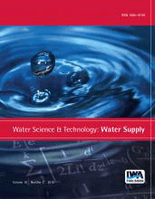
Water Supply
Scope & Guideline
Empowering sustainable water solutions.
Introduction
Aims and Scopes
- Water Quality Assessment and Management:
Research on methods and techniques for assessing water quality, including the development of water quality indices and the evaluation of contaminants in various water sources. - Hydrological Modeling and Simulation:
Utilization of hydrological models to simulate water flow, quality, and resource allocation, with applications in both rural and urban settings. - Sustainable Water Resource Management:
Studies focusing on strategies for sustainable management of water resources, including the integration of technology, policy, and community engagement. - Impact of Climate Change on Water Resources:
Research addressing the effects of climate change on water availability, quality, and management strategies, including adaptation and mitigation measures. - Innovative Water Treatment Technologies:
Exploration of new and improved methods for water treatment, including chemical, biological, and physical processes aimed at enhancing water quality for various uses. - Water Supply Systems Design and Optimization:
Focus on the design, operation, and optimization of water supply systems, including distribution networks, reservoir management, and infrastructure resilience. - Socioeconomic Aspects of Water Management:
Investigation into the social and economic implications of water management practices, including community perceptions, equity in access, and policy effectiveness.
Trending and Emerging
- Smart Water Management Technologies:
There is an increasing focus on the use of smart technologies, including IoT and artificial intelligence, for real-time monitoring, predictive analytics, and enhancing the efficiency of water supply systems. - Integrated Water Resources Management (IWRM):
Research emphasizing the integration of various water management strategies to address the interconnectedness of water, land, and environmental resources is becoming more prominent. - Climate Resilience and Adaptation Strategies:
With growing awareness of climate change impacts, studies focusing on resilience-building strategies for water supply systems are gaining traction. - Public Participation and Community Engagement:
Research exploring the role of community involvement in water management decisions is on the rise, reflecting a shift towards more democratic and inclusive governance models. - Sustainable Practices in Water Supply:
Emerging themes include the adoption of sustainable practices in water supply, such as rainwater harvesting, greywater reuse, and eco-friendly treatment technologies.
Declining or Waning
- Traditional Water Supply Infrastructure:
Research focusing primarily on conventional water supply infrastructure is decreasing, as the field shifts towards more integrated and sustainable approaches. - Static Water Quality Monitoring:
There is a waning interest in static monitoring techniques for water quality, with a growing preference for dynamic, real-time monitoring systems that utilize advanced technologies. - Single-Factor Water Management Approaches:
Studies that address water management from a singular perspective are declining, as there is a shift towards holistic, multi-faceted approaches that consider the interconnections between water, energy, and food.
Similar Journals

Asian Journal of Water Environment and Pollution
Empowering research to safeguard our water environment.Asian Journal of Water Environment and Pollution is a leading academic journal published by IOS PRESS, dedicated to advancing the field of water science and technology, as well as pollution management. With its ISSN 0972-9860 and E-ISSN 1875-8568, this journal serves as a pivotal platform for researchers, professionals, and academics alike who are keen to explore innovative solutions and interdisciplinary approaches toward water-related challenges and environmental issues. Although currently positioned in the Q4 category for both pollution and water science & technology, the journal aims to foster impactful research and discussions that can enhance the understanding and treatment of water pollution. The Asian Journal of Water Environment and Pollution not only plays a crucial role in disseminating knowledge but also encourages the sharing of findings from unique geographic perspectives, particularly from Asia. As the field evolves, this journal is poised to become a vital resource for those looking to contribute to sustainable water management practices and pollution reduction strategies.
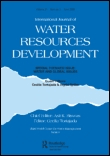
INTERNATIONAL JOURNAL OF WATER RESOURCES DEVELOPMENT
Driving impactful research for a sustainable water future.The INTERNATIONAL JOURNAL OF WATER RESOURCES DEVELOPMENT, published by ROUTLEDGE JOURNALS, TAYLOR & FRANCIS LTD, stands as a premier platform for disseminating cutting-edge research in the fields of water resources management and sustainable development. With an impressive impact factor indicated by its Q1 ranking in both Development and Water Science and Technology categories, this journal is pivotal for researchers and professionals seeking to advance their understanding of water-related challenges and solutions. Covering a broad spectrum of topics, it features contributions from leading experts, making it an essential resource for both academic inquiry and practical application. Although it does not currently offer Open Access, the journal's rigorous peer-review process ensures high-quality scholarship from 1983 to the present, reinforcing its role in shaping policies and practices globally. The journal is indexed in Scopus with notable rankings in Social Sciences and Environmental Science, highlighting its influence and reach within these vital sectors.
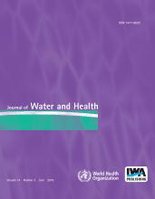
JOURNAL OF WATER AND HEALTH
Connecting water quality and public health for a sustainable future.The JOURNAL OF WATER AND HEALTH, published by IWA PUBLISHING, serves as a leading platform for disseminating innovative research related to water quality, sanitation, and public health. With its ISSN 1477-8920 and E-ISSN 1996-7829, this esteemed journal significantly contributes to the fields of Public Health, Environmental Science, and Microbiology, as evidenced by its robust rankings in several quartiles, including Q2 in Public Health and Water Science and Technology in 2023. This periodical enjoys a convergence of years from 2003 to 2024, underscoring its continuous relevance in addressing critical global issues such as water safety and infectious diseases. Although not an open-access journal, the insights and findings presented are pivotal for researchers, professionals, and students eager to contribute to the sustainable management of water resources and health improvements worldwide.
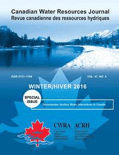
Canadian Water Resources Journal
Advancing sustainable solutions in water management.Canadian Water Resources Journal, published by Taylor & Francis Inc, is a leading academic journal dedicated to the field of water science and technology. With a significant history dating back to its inception in 1976, the journal offers a platform for high-quality, peer-reviewed research that addresses critical issues in water resources management, hydrology, water quality, and policy. The journal is recognized for its valuable contributions to the field, exemplified by its classification in the Q2 category for Water Science and Technology and holding a respectable rank of #137 out of 261 in the Scopus Environmental Science category. While it does not currently offer open access, its articles remain accessible through various institutional subscriptions, ensuring that professionals, researchers, and students stay updated with the latest advancements and discussions in water resources. As it converges towards its ongoing publication commitment through 2024, the Canadian Water Resources Journal remains an essential resource for those engaged in the pursuit of sustainable water management solutions.
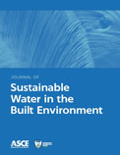
Journal of Sustainable Water in the Built Environment
Transforming research into actionable water policies.The Journal of Sustainable Water in the Built Environment, published by the American Society of Civil Engineers (ASCE), is a pivotal platform dedicated to advancing knowledge and practices in the fields of water resource management and sustainable infrastructure. Since its inception in 2015, the journal has adopted a rigorous approach to publishing high-quality research and reviews, as evidenced by its Q2 ranking in both Management, Monitoring, Policy and Law and Water Science and Technology categories as of 2023. With an ISSN of 2379-6111, the journal plays a critical role in shaping policies and innovative technologies that address the unique challenges associated with water sustainability in urban environments. Located in the United States, it attracts a diverse audience of researchers, professionals, and students focused on interdisciplinary solutions. Although it follows a traditional publishing model, the journal is committed to making impactful contributions to the academic community and beyond, fostering collaboration and knowledge exchange through its publications. Address all correspondence to 1801 Alexander Bell Dr, Reston, VA 20191-4400.

Water Resources
Shaping the future of water resources through rigorous research.Water Resources, a prominent journal published by MAIK NAUKA/INTERPERIODICA/SPRINGER, focuses on the critical and evolving field of water science and technology. Established in 1976 and with a long-standing commitment to advancing knowledge, this journal explores interdisciplinary research that addresses the challenges surrounding water resource management, quality, and sustainability. With an impact factor positioned within the Q3 category of its field, it holds a notable Scopus rank (#181/261) in Environmental Science, emphasizing its role in driving scholarly discourse. While currently not open access, Water Resources provides vital insights for researchers, professionals, and students, making it an essential resource for those seeking to innovate and implement effective water management solutions. To stay ahead in a domain that is increasingly paramount to global sustainability efforts, consider engaging with the latest research published in this vital journal.
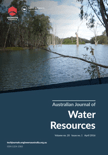
Australasian Journal of Water Resources
Empowering Researchers to Tackle Water ChallengesThe Australasian Journal of Water Resources, published by Taylor & Francis AS, stands as a pivotal resource in the field of water science and technology. With an ISSN of 1324-1583 and E-ISSN 2204-227X, this esteemed journal facilitates the dissemination of high-quality research articles that address critical issues facing water resources management across Australasia and beyond. Ranking in the Q2 category for Water Science and Technology as per the 2023 metrics, it boasts an impressive Scopus ranking of 75/261 in Environmental Science, placing it in the 71st percentile for its field. Spanning from 2008 to 2024, the journal emphasizes the importance of sustainable water practices, innovative technologies, and environmental policy, making it an invaluable asset for researchers, professionals, and students seeking to advance their knowledge and contribute to the discourse on water management challenges. The journal's rigorous peer-review process and commitment to open academic dialogue ensure that emerging trends and pioneering ideas receive the attention they deserve.
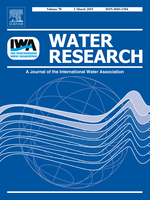
WATER RESEARCH
Leading the charge in interdisciplinary water studies.WATER RESEARCH, published by Pergamon-Elsevier Science Ltd, is a premier international journal dedicated to the advancement of knowledge in the interdisciplinary field of water science and technology. With a significant impact factor, WATER RESEARCH holds a distinguished position, consistently ranking in the top quartile (Q1) across multiple categories including Civil and Structural Engineering, Environmental Engineering, and Pollution. Established in 1967 and set to continue its legacy until at least 2024, this journal provides a vital platform for researchers and professionals to disseminate cutting-edge findings related to water sustainability, quality, and management. Although the journal follows a traditional access model, its commitment to disseminating impactful research ensures that it remains an essential resource for academia and industry alike. With a rigorous selection process, the journal includes articles that significantly contribute to the understanding and resolution of global water-related challenges, making it an invaluable asset for researchers, students, and practitioners engaged in this critical area of study.

H2Open Journal
Connecting minds to innovate in water sustainability.H2Open Journal, published by IWA Publishing, is a leading open-access platform established in 2018, dedicated to advancing the field of water science and technology. With its E-ISSN 2616-6518, this journal caters to a global audience, providing essential research insights that span various domains, including environmental science, management, monitoring, policy, law, and water science. The journal has achieved notable recognition in recent years, holding a Q3 ranking in three distinct categories within the 2023 environmental science metrics. Its commitment to open access ensures that valuable research is freely available to researchers, professionals, and students alike, fostering collaboration and innovation in water-related disciplines. With a focused publication strategy spanning from 2018 to 2024, H2Open Journal is poised to be a pivotal resource for addressing critical challenges in water sustainability and management, reflecting the pressing need for informed actions in the face of global water issues.

Water
Pioneering research at the intersection of water and environment.Water, an esteemed journal published by MDPI, serves as a pivotal resource for global research in the fields of aquatic science, biochemistry, geography, and water science and technology. Since its inception in 2009, this open-access journal has committed itself to advancing knowledge regarding water-related topics by fostering a platform that encourages the dissemination of high-quality research. With its impressive impact factor reflecting its relevance and influence, Water ranks in the top quartiles in various categories, including Q1 in Aquatic Science and Water Science and Technology, showcasing its commitment to publishing cutting-edge findings that resonate deeply with the environmental and biological sciences community. Located in Basel, Switzerland, the journal prioritizes accessibility for researchers, professionals, and students alike, aligning with the broader scientific goal of addressing urgent water challenges through collaborative and interdisciplinary research.